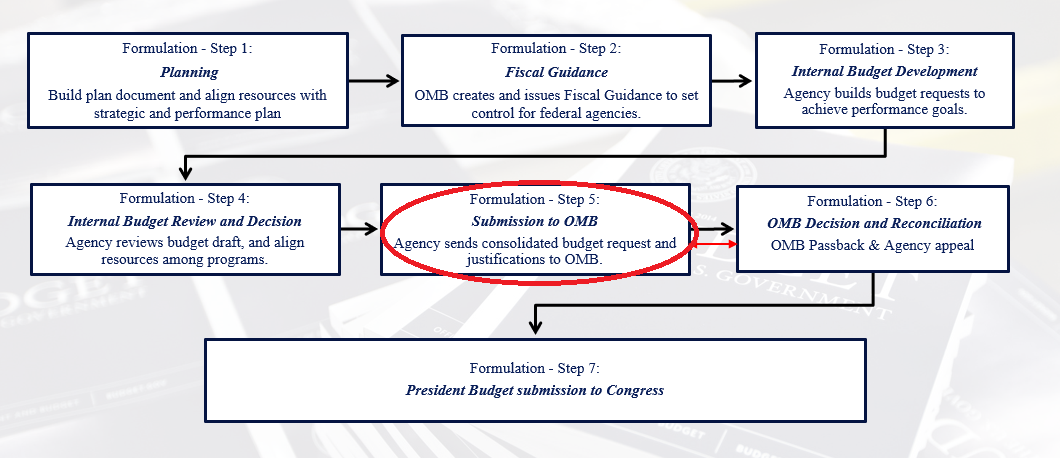Formulation - Step 5: Submission to OMB

OMB was created by the 1921 Budget and Accounting Act as the Bureau of the Budget, and be reconstituted as OMB in 1970. Its primary function is to oversee the development and implementation of the federal budget. In some years, OMB has the dominant role in budget policy; in other seasons, it faces tough competition from other presidential agencies and advisors. OMB reviews major policy issues and updates its multi-year forecasts for spending and revenue. Together with the Council of Economic Advisers (CEA), it reviews the budget outlook and policy alternatives and presented to the President.
After the President makes his initial policy decisions regarding the budget, OMB is responsible for notifying federal departments and agencies. These decisions may include specific budgetary guidelines and spending ceilings to be used by agencies in the preparation of their budgets. Generally, these instructions vary from year to year depending on current budgetary and political conditions. OMB communicates process and policy guidelines to agencies through circulars, bulletins, and other detailed communications. In particular, OMB Circular No. A-11 contains detailed instructions and schedules for submission of agency budget requests and other material to ensure that budget requests adhere to standardized conventions and formats. OMB staff also maintain ongoing contact with agencies as they formulate their budget requests to provide guidance and to keep apprised of agencies’ budgetary concerns.
Federal agencies annual budget requests include:
- 1. Budget data submission to OMB MAX system with required format;
- 2. Detail budget justification to explain program changes and expenditure types;
- 3. Executive summary to highlight submission packages;
- 4. Required budget exhibits to provide additional inside on selected expenditure categories and programs;
- 5. Prior year execution financial results and performance report;
- 6. Issue paper to address additional resource request.
Federal agencies submit their formal budget requests to OMB in early fall, usually about five months before the President Budget submission to Congress. OMB reviews executive agencies annual budget request to ensure that they are consistent with the President’s policy objectives. If an agency includes legislative initiatives in its budget request, OMB determines whether the proposals are consistent with the President’s policy goals. Agency requests are first reviewed by the OMB program examiners who are responsible for the associated policy areas. Agency requests may also be reviewed by more senior OMB officials. Prior to making a recommendation, OMB program examiners may ask for additional information from agencies, either informally or by conducting formal hearings. Examiners’ recommendations are reviewed by more senior OMB officials, culminating in review and approval by the OMB Director and the President. Agencies have a brief period during which they may appeal to the President for higher levels than were recommended by OMB.
OMB also assists in the integration of program performance and budgeting. Under the Government Performance and Results Act (GPRA) of 1993 (P.L. 103-62), OMB is required to have agencies prepare annual performance plans along with their budget requests. Like agency budget requests, agency performance plans are submitted to OMB for review in early fall. OMB staff review the agency performance plans, and the OMB director gives final approval to these plans. Agencies must revise their performance plans to reflect these decisions. Based on these agency annual performance plans, OMB is required to prepare a government-wide performance plan as a part of the President’s budget. The “accountability tool” is intended to assist OMB budget examiners and agency program managers in making “evidence-based funding decisions.”
Previous: Formulation - Step 4: Internal Budget Review and Decision Next: Formulation - Step 6: OMB Decision and Reconciliation